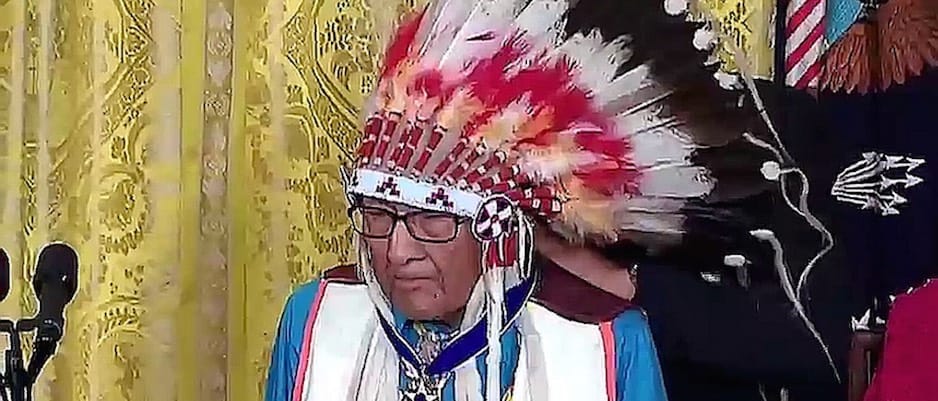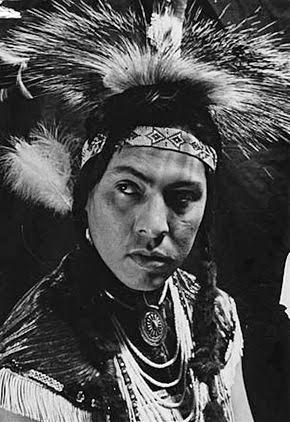War Songs of The Plains

Obituary: Joseph Medicine Crow, Reprinted from The Economist
Joseph Medicine Crow, last war chief of the Crow tribe, died on April 3rd, aged 102
THEY were on a path over the hills when Joseph Medicine Crow saw the horses: 50 of them. It made him pause, for there was never anything ordinary about these creatures. They were the most precious possession any Indian could have: the gift of the Sky World, with lightning in their limbs and starlight in their eyes. He longed to leap on one, bareback, and ride it away.

He was going ahead of his party, scouting the trail. It was a natural job for him, since from childhood he had been taught to notice bear-scrapes on bark, deer prints in mud, the habits of waterfowl and the distant suggestions of dust. Though his tribe, the Crow, had been confined to a reservation since 1884, he had been trained in the old nomadic ways: to sleep only on the floor, wrapped in a blanket; to be perfectly alert, ready to spring, the moment he woke; to harden his feet, by going barefoot in snow, for endless walking. His people had been employed as scouts by George Armstrong Custer before the battle of the Little Bighorn in 1876, when they had joined the white men against their old Plains enemies, the Lakota Sioux and the Cheyenne. As a very small child, hanging round the fire and the mysterious sweat lodges, he had heard the stories of four of these old-timers—including his maternal step-grandfather, White Man Runs Him—and relived the massacre of the blundering blue-uniformed soldiers through their ancient eyes.
Now, however, the year was 1945. He was no longer on the immense western Plains, but somewhere behind the Siegfried Line; and through his fieldglasses he could see that the men on the horses were German SS officers.
His childhood training had included facing his worst fears. “High Bird” was his Crow name, the imperturbable floating eagle. He had been made to jump into freezing rivers, fight with a Sioux boy, go to the white hospital full of doctors and ghosts, and to the public school where a white girl had stuck pins in him. Not many months back, he had been ordered to lead a squad through enemy machinegun fire to carry out some dynamite: to face death, in other words. His commanding officer had naturally assumed he would be the ideal man to do it.
Yet, along with his native skills, he was highly educated. He had been the first in his tribe to go to college and get a masters degree, and was more than halfway through a doctoral thesis when he was called up. His title was “The Effects of European Culture Contact upon the Economic, Social and Religious Life of the Crow Indians”. He found that influence good, in many ways. As a result of it he could read, write and get well-paid jobs, and he did not mind putting on a suit and tie, just for part of the day, to do them. All his life he was to be a bridge between the two worlds, lecturing on the need to combine the best of old ways and new, and encouraging amity and peace to reign, in particular, round the battlefield at Little Bighorn.
His call-up in 1943 raised typically mixed feelings. He wanted to prove himself in Europe, but in a Crow way. For them, warfare was seldom about killing. Rather it was an endless series of raids and horse-stealing in which young men showed how cunning, noble and resourceful they were, decorating their coup sticks with beads and feathers to prove it. It was, he thought, the finest sport in the world. He went on raids along the Siegfried Line with red war-paint under his uniform and a yellow-daubed eagle feather, symbol of his spirit-helper, tucked inside his helmet. In one village he collided with a German soldier. Rather than simply shooting him, he threw away his rifle and wrestled him into submission, as he had the Sioux boy long ago.
Memories preserved
Now, with the horses, his ancestral instincts definitely got the upper hand. He tracked them to where they were stabled and, at first light, crept past the guards to slip an Indian bridle on the best of them, a thoroughbred with a white blaze on its face. Vaulting on, he stampeded the rest out of the barn and over the hills, shouting a victory song in Crow as he rode. “High Bird! High Bird! You fought the Germans! You great warrior!” Only back in Montana, swapping war stories with the elders, did he realise that he had unconsciously performed—by grabbing the explosives, manhandling the enemy soldier, seizing his rifle and stealing the horses—the four deeds that established him as a war-chief of his people, as his paternal grandfather Medicine Crow had been before him in the buffalo days.
Some might think he had nothing to fight about in the decades that followed. Not so. Struggles multiplied against drugs, alcohol, joblessness and lack of funding on the Crow lands, which covered 3,600 square miles of plain and mountain. When, as war chief, he welcomed Barack Obama in 2008, he urged the presidential candidate to recognise native Americans as first-class citizens, not people “at the bottom of the ladder”. Carefully, in dozens of boxes stacked in his house and garage, he preserved handwritten stories of the old-timers and photographs, captioned in pencil, of their worn, proud, haunted faces. Honours poured down on him, as keeper of the memories of his tribe. At each award ceremony, including the one for his Medal of Freedom in the White House in 2009, he swung his coup stick and chanted a vigorous Crow war song, the only man truly qualified to sing one—and the last.
